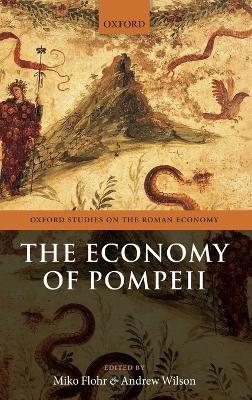
The Economy of Pompeii
Oxford University Press (Verlag)
978-0-19-878657-3 (ISBN)
This volume presents fourteen papers by Roman archaeologists and historians discussing approaches to the economic history of Pompeii, and the role of the Pompeian evidence in debates about the Roman economy.
Four themes are discussed. The first of these is the position of Pompeii and its agricultural environment, discussing the productivity and specialization of agriculture in the Vesuvian region, and the degree to which we can explain Pompeii's size and wealth on the basis of the city's economic hinterland. A second issue discussed is what Pompeians got out of their economy: how well-off were people in Pompeii? This involves discussing the consumption of everyday consumer goods, analyzing archaeobotanical remains to highlight the quality of Pompeian diets, and discussing what bone remains reveal about the health of the inhabitants of Pompeii. A third theme is economic life in the city: how are we to understand the evidence for crafts and manufacturing? How are we to assess Pompeii's commercial topography? Who were the people who actually invested in constructing shops and workshops? In which economic contexts were Pompeian paintings produced? Finally, the volume discusses money and business: how integrated was Pompeii into the wider world of commerce and exchange, and what can the many coins found at Pompeii tell us about this? What do the wax tablets found near Pompeii tell us about trade in the Bay of Naples in the first century AD? Together, the chapters of this volume highlight how Pompeii became a very rich community, and how it profited from its position in the centre of the Roman world.
Miko Flohr is postdoctoral researcher and lecturer at the Institute for History of Leiden University, and formerly assistant director of the Oxford Roman Economy Project. His main research focus lies with urban history in the Roman world, with a particular emphasis on economic issues in Roman Italy, and on textile economies. His first monograph, The World of the Fullo, was published with OUP in 2013; since, he has published on the textile economy of Pompeii, and on public investment in commercial space. Andrew Wilson is Professor of the Archaeology of the Roman Empire at All Souls College, University of Oxford. His research interests include the economy of the Roman empire, ancient technology, ancient water supply and usage, Roman North Africa, and archaeological field survey. Recent publications include: Quantifying the Roman Economy: Methods and Problems (ed. with Alan Bowman, Oxford, 2009), Settlement, Urbanization and Population (ed. with Alan Bowman, Oxford, 2011); The Roman Agricultural Economy: Organization, Investment, and Production (ed. with Alan Bowman, Oxford, 2013); Alexandria and the North-Western Delta (ed. with Damian Robinson, Oxford, 2010) and Maritime Archaeology and Ancient Trade in the Mediterranean (ed. with Damian Robinson, Oxford 2011).
PART I: CITY AND HINTERLAND; PART II: QUALITY OF LIFE; PART III: ECONOMIC LIFE AND ITS CONTEXTS; PART IV: MONEY AND TRADE; PART V: DISCUSSION
| Erscheinungsdatum | 24.12.2016 |
|---|---|
| Reihe/Serie | Oxford Studies on the Roman Economy |
| Verlagsort | Oxford |
| Sprache | englisch |
| Maße | 168 x 240 mm |
| Gewicht | 906 g |
| Themenwelt | Geschichte ► Allgemeine Geschichte ► Vor- und Frühgeschichte |
| Geschichte ► Allgemeine Geschichte ► Altertum / Antike | |
| Geisteswissenschaften ► Geschichte ► Regional- / Ländergeschichte | |
| Geschichte ► Teilgebiete der Geschichte ► Wirtschaftsgeschichte | |
| ISBN-10 | 0-19-878657-3 / 0198786573 |
| ISBN-13 | 978-0-19-878657-3 / 9780198786573 |
| Zustand | Neuware |
| Haben Sie eine Frage zum Produkt? |
aus dem Bereich


